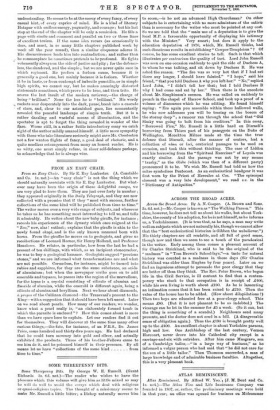ACROSS THE BROAD ACRES.
Across the Broad Acres. By A. N. Cooper. (A. Brown and Sons. 3s. 6d. net.)—Mr. Cooper is known as " The Walking Parson." This time, however, he does not tell us about his walks, but about York- shire, the county of his adoption, for he is not himself, as he informs us, a Yorkshireman. (It is true that, as he says, a man may write well on subjects which are not naturally his, though we cannot allow that the " best ecclesiastical historian is Gibbon the unbeliever.") His thirty chapters are all readable, and all full of good sense, though now and then we seem to see a touch of the paradoxical in the writer. Early among them comes a pleasant account of Sir Charles Strickland, who is said to be the original of the " madman" in " Tom Brown's Schooldays,"—a taste for natural history was counted as a madness in those days (Sir Charles Strickland was older than Hughes by four years). Later on • we find an ingenious attempt to persuade the poor clergy that they are better off than they think. The Rev. Peter Brown, who began life in the. Civil Service, is ill content to find that a contem- porary who stuck to that occupation is in receipt, of £400, while his own living is worth about £190. As he is lamenting an intimation comes that it has been raised to £210. Then the value of the house has to be added. (How about dilapidatious ?) Then two boys are educated free at a poor-clergy school. This means £80. (But it is not pleasant to be so indebted.) The vicarage can be let in the summer for £5 a week. (So it can, but the thing is something of a scandal.) Neighbours send many presents, and the doctor does not send in a bill. (A disagreeable sense of obligation again.) Thus the £190 is brought pretty well up to the £400. An excellent chapter is about Yorkshire parsons, high and low. One Archbishop of the last century, Vernon Harcourt, never drove into his Cathedral city except in a carriage-and-six with outriders. After him came Musgrave, son of a Cambridge tailor,—" in a large way of business," as he informed a vulgar person who had said that "he did not care for the son of a little tailor." Then Thomson succeeded, a man of large knowledge and of admirable business faculties. Altogether, this is a very pleasant book.




























































 Previous page
Previous page